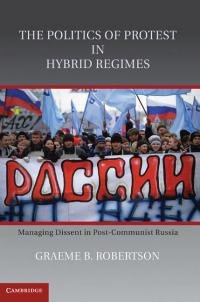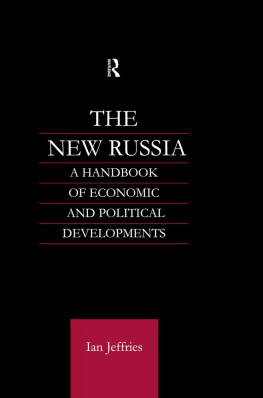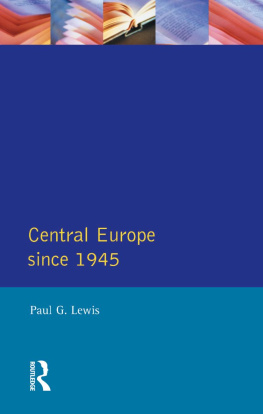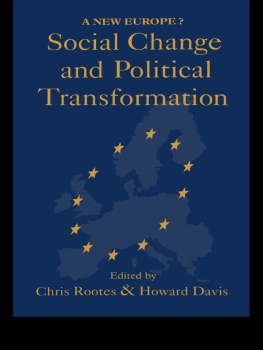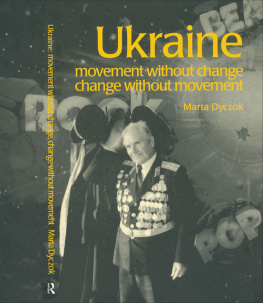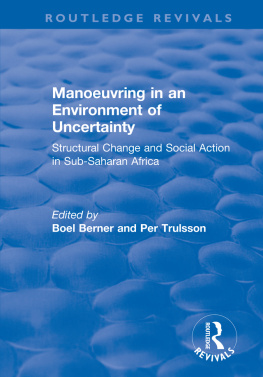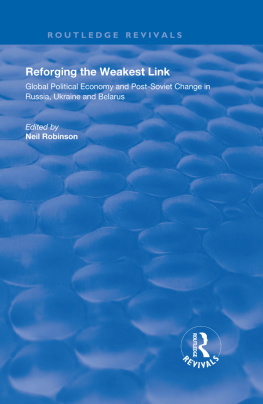LABOUR AND POLITICAL TRANSFORMATION IN RUSSIA AND UKRAINE
To the memory of my father, Helmut Erwin Simon
Labour and Political Transformation in Russia and Ukraine
Rick Simon
The Nottingham Trent University
First published 2000 by Ashgate Publishing
Reissued 2019 by Routledge
2 Park Square, Milton Park, Abingdon, Oxon, OX14 4RN
52 Vanderbilt Avenue, New York, NY 10017
Routledge is an imprint of the Taylor & Francis Group, an informa business
Rick Simon 2000
All rights reserved. No part of this book may be reprinted or reproduced or utilised in any form or by any electronic, mechanical, or other means, now known or hereafter invented, including photocopying and recording, or in any information storage or retrieval system, without permission in writing from the publishers.
Notice:
Product or corporate names may be trademarks or registered trademarks, and are used only for identification and explanation without intent to infringe.
Publishers Note
The publisher has gone to great lengths to ensure the quality of this reprint but points out that some imperfections in the original copies may be apparent.
Disclaimer
The publisher has made every effort to trace copyright holders and welcomes correspondence from those they have been unable to contact.
A Library of Congress record exists under LC control number:
ISBN 13: 978-1-138-73216-2 (hbk)
ISBN 13: 978-1-315-18860-7 (ebk)
This book began life in 1990 as a doctoral dissertation at the University of Birmingham's Centre for Russian and East European Studies (CREES). The PhD was originally envisaged as a comparison of the emerging workers' movements in the Kuzbass and Donbass regions of the Soviet Union. However, before I had done little more than some background research on the relationship between workers and the Soviet state, the latter had disintegrated and the objects of my research were now located in two, newly-independent states. I had also become increasingly dissatisfied with the focus of mainstream democratisation literature on the role of elites and domestic factors in promoting political transformation and felt that this underplayed the interrelationship of domestic and global processes, as well as denigrating the role played by popular forces in undermining authoritarian regimes and promoting a democratic alternative. My thesis, therefore, transmuted into a more synthetic approach to the question of the labour's role in democratisation processes, utilising the collapse of the USSR and the subsequent evolution of Russia and Ukraine as case studies. The originality of both the Phd and this book lies, I hope, in the discussion of the global context of political change and of the role played by workers in the transformation of the Soviet Union.
I have used the transliteration system usually applied in the United Kingdom with the exception of names that have become accepted under a certain spelling, for example Trotsky and Yeltsin. To avoid any confusion, all Ukrainian place names have been transliterated from the Ukrainian versions operative since independence even when this applies to the Soviet period.
I would like to acknowledge the help of the following people in the writing of this book (with the usual caveat that they bear no responsibility whatsoever for its final form): Judy Batt, Vadim Borisov, Kirill Buketov, Simon Clarke, Boris Kagarlitsky, Arfon Rees, Sheffield Trades Council, Serge and Larissa, and my colleagues in the department of Economics and Politics at Nottingham Trent University, especially my great friend, Larry Wilde, who has provided unstinting support and encouragement throughout my academic career. I would also like to thank Sandra Odell for her administrative assistance. I am grateful to Nottingham Trent University for providing funds for me to travel to Russia and Ukraine to undertake research.
I would finally like to dedicate this book to my dad, for introducing me to the joys of the Eastern bloc, to my partner Tina, for introducing me to many other joys of life, and to our daughter, Dora, for being a joy and a barmy distraction from the pressures of academic work.
Introduction
The final quarter of the twentieth century was characterised by fundamental changes in the global political landscape. On one hand, an unprecedented shift occurred from authoritarian regimes to forms of liberal democracy in various regions of the world. Perhaps of greatest significance, the so-called 'communist' regimes of the USSR and Eastern Europe collapsed, ending the Cold War and seemingly putting an end to communism as an ideological force. The scale of this transformation was sufficient for it to be called a 'global democratic revolution' (Diamond 1993) or, in Samuel Huntington's phrase, the 'third wave' of democratisation, the first two 'waves' having occurred in the late 19th and early 20th centuries and after World War II (Huntington 1991).
Such dramatic changes of course present a challenge to political scientists in terms of analysing their causes, the social forces behind them and their future prospects. As a consequence, studies of democratisation have constituted perhaps the most extensive literature in political science over the past 15 years. Geoffrey Pridham argues that two basic approaches to the analysis of democratic transitions have developed: the 'functionalist' or 'macro-oriented' school and the 'genetic' or 'micro-oriented' school (Pridham 1994, p.16). The former approach is undoubtedly linked to 'modernisation' theory, which states basically that all societies undergo a process of development, following the lead established by the more advanced capitalist states, and that as a result of attaining a more complex industrial society the prerequisites emerge for the establishment of liberal democracy. Thus, democratisation is linked fundamentally to long-term processes of capitalist development. The latter perspective, on the other hand, can be said to possess the following basic features: first, 'the reasons for launching a transition can be found predominantly in domestic, internal factors' (O'Donnell 1986, p.18); second, the motor force behind these transitions has, in almost all cases, been ascribed to elites of one kind or another rather than to popular action: 'elite dispositions, calculations and pacts' ' largely determine whether or not an opening [to democracy] will occur at all ' (O'Donnell & Schmitter, pp.19, 48); finally, the assumption is made, sometimes explicitly, sometimes implicitly, that pressure for radical social change to accompany democratisation endangers the whole transition project and threatens a resumption of authoritarian rule, thus creating a particularly narrow vision of what constitutes democracy. Whereas modernisation theory was very influential in the late 1950s and early 1960s, and gained fresh impetus in the 1980s, the pendulum among analysts has swung over the past ten years away from modernisation theorists, with their emphasis on the prerequisites of democracy, to those who concentrate on the process and techniques of democratisation itself (Shin).
Even critics of O'Donnell and Schmitter, the foremost proponents of the 'genetic' approach, have agreed with these emphases. Daniel Levine has argued that 'elements such as effective leadership, organizational strength, deliberate consensus building, and close attention to institutionalization' have been central to democratic transition and consolidation. He suggests, moreover, that 'creative and committed political actors have repeatedly underscored the centrality of national-level politics, countering deterministic expectations according to which national patterns are ineluctably set by the play of global or regional forces' (Levine, pp.377-8).


